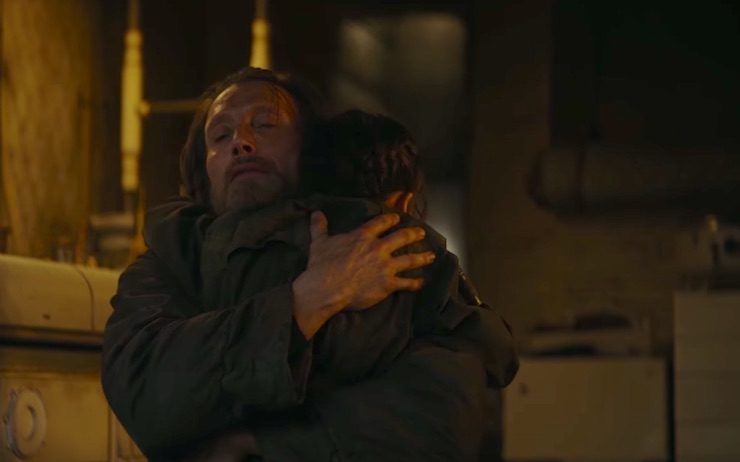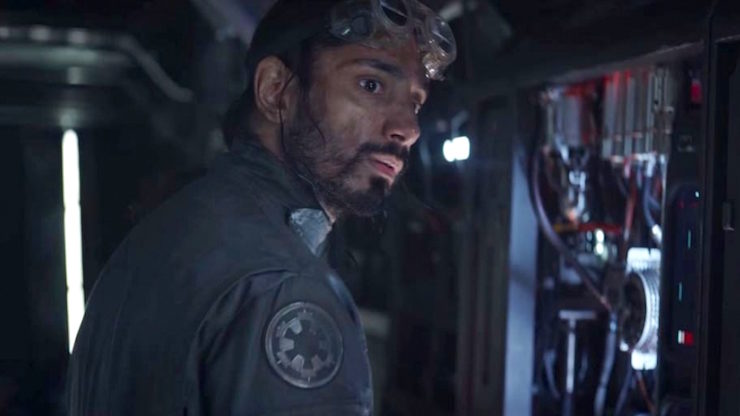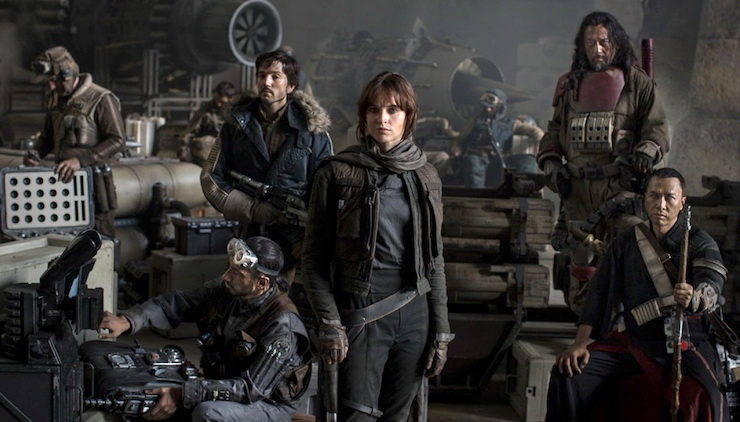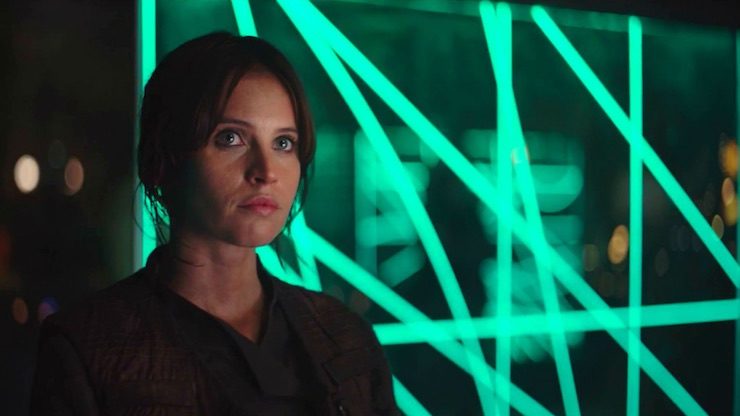Rogue One is possibly the most thematically chewy Star Wars movie so far. Whether you loved it, hated it, liked it but thought it needed fixing, or are simply pining for a prequel starring the best Gay Asian Space Uncles EVER, there’s a lot to digest. What I found most interesting, though, was the way that two characters can be seen as responsible for shaping not only the tactics of the Rebellion, but its entire character—as well as the price they paid for doing so.
First off, Sergeant Jyn Erso herself. The heart of Rogue One, Jyn is also one of the characters who has attracted the most controversy. There’s a legitimate reading of the movie that has her buried under a mountain of daddy issues. There’s another that paints her as entirely reactive and sees her emotional journey as truncated or unearned.
Truncated, I think, is fair. Unearned or unrealized? That I’d disagree with. Specifically, she has two lines of dialogue that clearly mark not only where she is on her emotional journey but signal a gear change for the movie itself. The first arrives during her conversation with Saw Gerrera on Jedha. His warning that “The world is coming undone. Imperial flags reign across the galaxy…” is followed by her retort:
“It’s not a problem if you don’t look up.”
That line hits like a slap to the face. This is Jyn not as a rebel, a criminal, or the daughter of Galen Erso. This is Jyn as every Republic citizen who turns away when they see white armour, or who doesn’t react when their neighbour is arrested in the middle of the night. This is Jyn as one of us. And the film is brave enough to show us the reality that we’re often too frightened or too worn down to make a stand when we should.
The line also demonstrates that she’s at the start of her emotional arc even as she, and the film, take a massive leap forward once the message from Galen is revealed. If the first act is Jyn being pressed into service against her will, the second act sees her suddenly running headlong into service while Cassian mutters something about how they need to be careful and she disappears into the middle distance.
That all-consuming need she feels to rescue her father and the family reputation is, in turn, tied to her own desire to be free. Jyn has lived in horror for at least a decade at this point and she’s motivated as much to make those feelings stop as she is to save Galen. That goes a long way towards helping us understand why she’s so unconcerned with everything other than her father. It’s not just that he’s family, or that he may not be the villain he seems to be. It’s that Jyn is still the terrified little girl who watched her mother die and her father disappear and she’d REALLY like to move on. Her state of mind at this point in the film strongly reminded me of classic Buffy episode “Normal Again,” in which Buffy grapples with similar issues. There’s the same desperate need to move on but as we see, Jyn’s freedom comes with more certainty than Buffy’s—but at a heavier price.

It’s also worth noting that at this point, she’s with the Rebellion but not part of it. That changes on Eadu. There, Cassian Andor—who, like the rest of the main characters, deserves an essay to himself—is all set to assassinate Galen from a safe distance. It’s a perfect opportunity to hobble the Death Star Project and it makes absolute sense to do it. Jyn, by contrast, climbs a mountain-sized ladder and sneaks, alone, into an Imperial compound convinced that she can somehow find and save her dad. That’s a tactical play straight out of the same book as “Ride my feathery lizard into certain death” and “Improvise an assault on a heavily armed and armoured bunker aided only by a small group of Rebel commandos and a large tribe of almost certainly cannibalistic teddy bears.”
In other words, Jyn is a Rebel before the Rebellion itself truly comes into its own. And the fact that Cassian, broken by years of killing in the name of those who he desperately hopes are the good guys, doesn’t shoot Galen speaks to the power such an approach can have. Jyn leads by example, especially when that example is tactically unsound but morally right.
Which leads us to her second pivotal line:
“You give way to an enemy this evil with this much power and you condemn the galaxy to an eternity of submission.”
This statement is a world away from “It’s not a problem if you don’t look up.” She’s no longer looking for her dad, or mourning her stolen years. She’s free, not just of her father’s shadow, but of the caution and constraints that prevent Mon Mothma, Bail Organa, and the rest from acting.
She is, literally and metaphorically, a rebel: outside the command structure, alone aside from the friends she’s accrued by accident rather than design, and at absolute peace with the fact that what she has to do is also almost certainly the last thing she will ever do. That’s why Cassian and his team of broken toy soldiers join her, and why Baze and Chirrut stay with her. Jyn isn’t concerned with what should be done. She’s focused on doing what’s right. For these men and women, trapped in the moral grey area of a cold war that’s fast becoming hot, that’s less a light at the end of the tunnel than it is the standard they’ve desperately needed to rally around.
Better still, this puts Jyn absolutely in line with every other Star Wars protagonist: General Leia, Rey, Luke, Han, Finn, Poe. They’re all people who will put the greater good above their own welfare, all people with a healthy disrespect for authority and a fondness for making up plans on the fly. Like Jyn herself says, they’re all rebels. And they all start with her.
Her, and Bodhi Rook.

Where Jyn’s determination and distrust of the system is the catalyst for Rogue One‘s first and last official mission, it’s Bodhi who provides the moral counterpoint to that. Like Jyn, he’s grown up under the Empire. Like her, he’s made the best of it, just like many of us would. Stay out of trouble, help people when you can, take a job, keep your head down.
Don’t look up.
Until he doesn’t have a choice.
We don’t see the moment in which Bodhi looks up but we do see the consequences of that moment. His almost impossibly brave decision to defect is one the film spends much of its running time punishing him for. Tortured, interrogated, and almost psychologically broken, Bodhi’s reward for doing the right thing is to be placed in constant danger and mistrusted by everyone.
It doesn’t matter. Just like Jyn, he’s driven to keep going. But where Jyn lives in the shadow of her father, Bodhi is aided in his escape by Galen. In many ways, Bodhi’s escape is the expression of Galen’s own horror at the project. Bodhi is the person he can save in the hope that Bodhi and Jyn will save everyone else. The fact that Bodhi is an Everyman just adds weight to his own persistent acts of courage. It’s especially notable that the one time he kills “fellow” Imperial staff, on Eadu, he’s visibly troubled by it. Bodhi’s a good man and, much like Cassian and his list of victims for the “greater good,” that has a price.
But it’s one of Bodhi’s last actions that has the greatest emotional impact. Make no mistake, pretty much the entire final act of Rogue One is a tearjerker marathon, but one of the scenes that hits the hardest is all Bodhi. Preparing to lift off for the Scarif raid, Yavin IV traffic control demand a call sign for the team’s stolen Imperial cargo shuttle. A panicked Bodhi is at a loss for words until Jyn encourages him, he visibly calms and gives them the call sign that gives the movie its title:
“It’s Rogue…Rogue One.”
It’s difficult to count all the ways this moment resonates. That Bodhi is played by Riz Ahmed, the son of Pakistani immigrants to the UK, is the most immediate. Heroes can look like anyone. Heroes DO look like anyone, and this is the first Star Wars movie in the history of the franchise to date that’s really shown that. Along with fellow cast members Donny Yen, Jiang Wen, and Diego Luna, he’s a long overdue embodiment of how diversity and representation can not only make stories different but make them better. Bodhi, Ahmed, and their colleagues are the embodiment of progress that’s necessary, long overdue, incomplete but, finally, in motion.

Then there’s the proud relevance of the code name and the retroactive blueprint for Rebel military tactics (do something stupid and impossible! Break all the things! Leg it!) that the raid provides. At this point in the Rebel’s existence, “going rogue” is a crime. After Scarif, it’s a badge of honor.
This moment is also his equivalent of Jyn seeing her father’s message on Scarif. Bodhi is at peace with what he has to do here on out, although it’s interesting to note that pacifism seems to still be part of his world view. He takes great pains to not kill anyone on Scarif even though that ends up costing him his life. The fact that his moral choices make little difference in the ultimate outcome is also interesting. It doesn’t mean his actions and sacrifice are meaningless—if anything, it gives them even more weight.
But the consequence of this moment that hits the hardest is the one we don’t see. That the Rebel Alliance’s most fearsome, most respected squadron of fighter pilots is formed to honor both Jyn’s team and the name Bodhi chose. The greatest pilots in Rebel history (Poe would come later, of course), flying under a banner given to them by an Imperial deserter who sacrificed his life to give them a chance.
The Death Star plans may be at the center of the narrative but the heart of Rogue One’s symbolic story is the birth of the Rebel Alliance. An alliance defined by, more than anything else, the actions and beliefs of a war orphan and a defector who lay down their lives for a chance at a better world. That, just as much as the Death Star plans, is the hope Rogue One delivers.
This article was originally published January 2017.
Alasdair Stuart is a freelancer writer, RPG writer and podcaster. He owns Escape Artists, who publish the short fiction podcasts Escape Pod, Pseudopod, Podcastle, Cast of Wonders, and the magazine Mothership Zeta. He blogs enthusiastically about pop culture, cooking and exercise at Alasdairstuart.com, and tweets @AlasdairStuart.











Right, but for Jyn, we don’t get a good explanation of how she goes from “don’t look up” to “eternity of submission.” She spent a bunch of years fighting with Saw, and then got disillusioned or whatever and left to become a woman on the fringe, a criminal looking to exploit whatever squeezed out of the Empire’s tightening grip. So we meet her as a disinterested, apolitical player. She knows her father is working for the Empire.
And then, what? She sees a hologram of her dad telling her that maybe no, he’s not working for the Empire, so now she’s a committed rebel? The flip is most definitely unearned. If she’s looking to redeem her family’s name, well, when she thought her family were collaborators she didn’t care. And now she knows Galen isn’t, or not totally, and now she’s motivated to clear his name, when he’s just done it? How does that follow? If the idea is that her relationship with her father’s memory and legacy is what is muddling/influencing her political views, you need to give a little more screen time to that – that way, her emotions in the moment make more sense, are the light-through-the-clouds moment, and not just a huge overreaction to her father telling his daughter he loves her. I agree that her attitude after Scarif is the right one, and is emblematic of all that the Rebellion stands for at its heart (even if its political leaders don’t always agree). But her arrival there is WAY too forced. There’s an entire middle act of her story missing. Uninterested criminal straight to die-hard Rebel? Why not a moment of her wrestling with her father’s words and actions, and deciding to honor him by fighting for what he believed in? Or of realizing how brutal the Empire was by having it hit home when they kill her last remaining family member, and turning away after that?
And the Rebellion is known for stupid plans and long odds because they’re heavily outgunned and only stupid, suicidally dangerous plans can work. Jyn doesn’t embody or begin that, she’s just the latest in a long string of Rebels without the proper resources to do her job. Saw Guerrero is fighting the same long odds, long before Jyn joins up.
Ewoks aren’t cannibals, they’re predators. It’s only cannibalism if one is eating members of one’s own species.
@2 – In a world with multiple sentient species, it can be argued that cannibalism SHOULD be expanded to include “the eating of sentient life”, rather than being species specific.
@1: “She knows her father is working for the Empire.”
Does she? I seem to recall that her answer to the Rebel leaders about her father’s whereabouts is “I like to think he’s dead.” That offers at least some support for the idea that she really doesn’t know what’s happened to him.
@3 agree!!
Its strange, I am normally one to over analyze a movie or a book, to the point friends and family don’t want to discuss them with me :) But for some reason I was very easily able to slip into this movie/story and turn off that part of my thinking. This is without a doubt my 2nd favorite Star Wars film and comes very close to being number one, Empire Strikes Back being my favorite.
This is one of those where the novelization is able to much better get into the heads of the characters and show the emotional journey in ways the movie did not. A lot of it is jumpstarted by dramatic events in a short timeframe, but they still happen–I just wish there was a little more room in the film given over to that as well, or a better way of expressing it. The film moves so quickly, and with the last minute reworks of the later act, it gets skimmed over a bit. I do love this movie and these characters, though. I recommend the novelization as well, it’s one of the good ones.
Great article. I’m saving this one for sure!
@1 Andy: I don’t have the same read on Jyn as you do. “It’s not a problem if you don’t look up” isn’t the voice of someone who doesn’t care. It’s the voice of someone who can’t afford to care. She’s someone who lost her parents at an early age, who’s spent most of her life without a friend in the world except Saw Gerrera (a violent radical, even by Rebellion standards). It’s taken everything she has just to survive. When we first see her as an adult, she’s in jail. So when Cassian comes into her life, she resists at first — he’s trying to drag her from the frying pan into the fire. Who wouldn’t have the same reaction, given her situation?
But when she sees her father’s hologram, when she understands his plan, it’s a light at the end of the tunnel. It’s not about clearing her family name — at first, it’s mostly about getting her father back, but then after he dies, it’s about fulfilling the purpose he died for, and striking a blow against the Empire. Before, she literally could not do that in a way that would make any kind of meaningful difference (though that doesn’t mean she hadn’t tried; she was in jail, after all). Now, suddenly, her father’s message gives her hope — which is of course the overarching theme of the entire movie — and she grabs onto it like a drowning woman.
The Jyn Erso who says “It’s not a problem if you don’t look up” is someone who’s given up hope. Her character arc is all about getting back that hope, and spreading it to others.
(And this is the first time I’ve thought this much about her character motivations!)
Yes, thank you Alasdair. All of this essay, yes.
@5 – sdzald: This is my second favorite too.
@7 – Matthew: You’re entirely right about Jyn.
I loved this essay then and I love it now.
@@.-@ – to me that meant that she DID know or at least heavily suspect. That’s why she says she’d LIKE to think he’s dead.
As to 1 to me it was more about making sure her father’s sacrifice wasn’t in vain; that now perhaps her name was worth clearing. But then I didn’t really have any problem with the motivations of people in the movie.
@7, 8 – agreed :)
This essay (and the comments) make me so happy. Rogue One is one of my favorite movies, period, and it’s largely because of Jyn and Bodhi’s arcs and how they seek purpose.
@1: I think we do, subtly, see Jyn wrestling with how to respond to her father and his charge to her – in her argument with Cassian right after leaving Eadu. Like @7 says, at first she is laser-focused on getting her father back and isn’t willing to care about the Rebels’ goals. When Galen dies, her response is simply to be angry and lash out at Cassian and, by extension, the Rebels who killed him. But Cassian pushes back. “You’re not the only one who lost everything,” he says. “Some of us just decided to do something about it.”
I think that’s where Jyn begins to realize that maybe she can do something about it, maybe she should do something about it.
Jyn’s sharp words to Cassian about his following orders even when he knows they’re wrong (“you might as well be a stormtrooper”) seems like they also helped push him into being willing to defy the council and go to Scarif with Rogue One. I think that argument, and the way Jyn and Cassian respond by actually listening to each other, is one of the core moments in the movie: finding hope and purpose through reconciliation.